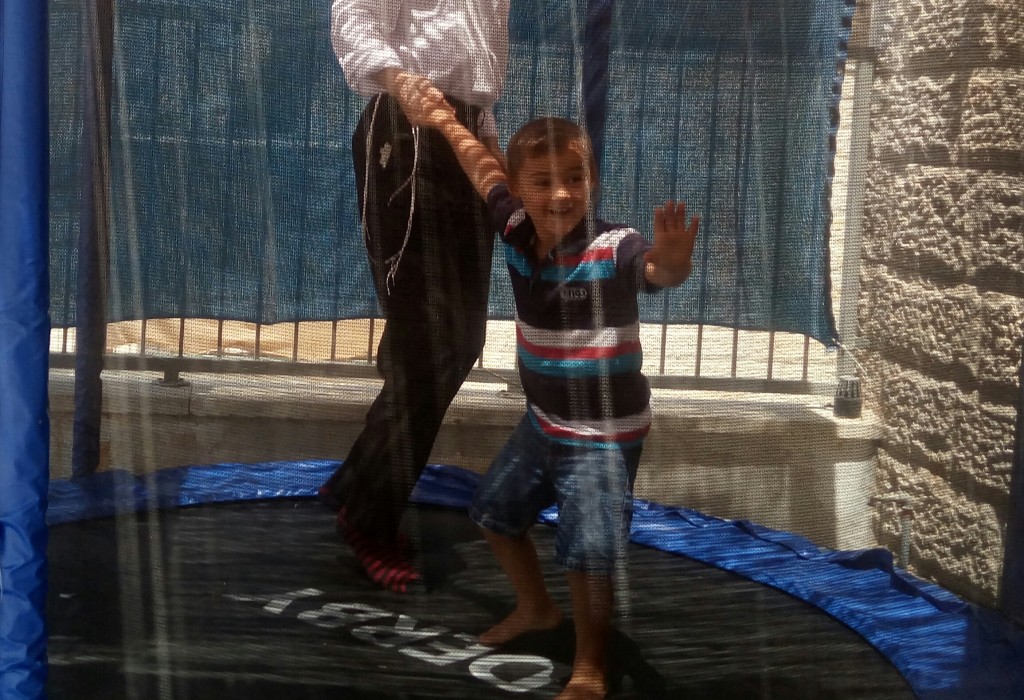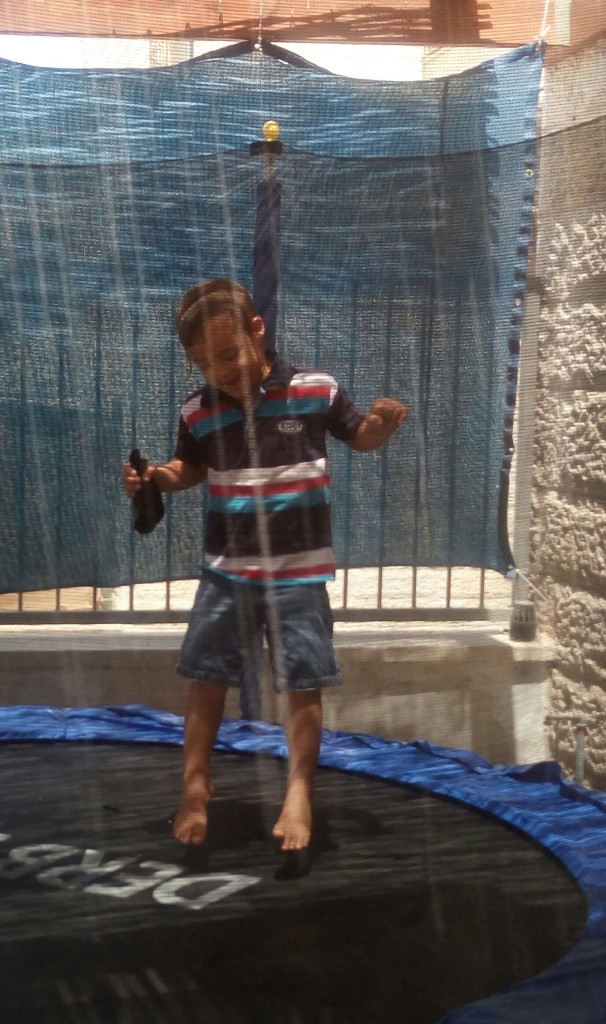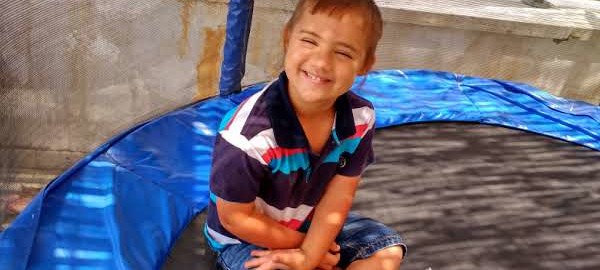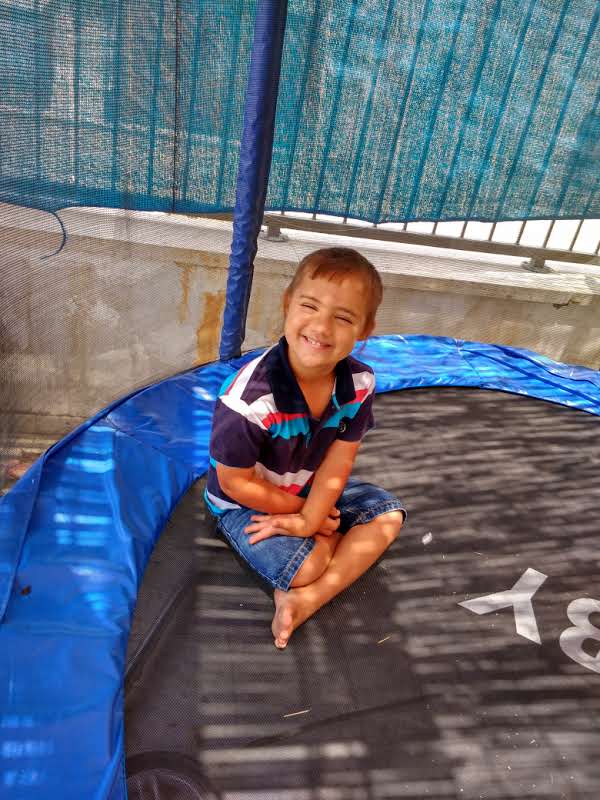Can you believe that Yirmi just recently turned 5?
Until Yirmi was born and we received the birth diagnosis of Trisomy 21, I knew very little about what that entailed. I had the stereotypical perceptions of people with Down syndrome based on very limited personal connection. When Yirmi was born, my eyes were opened to a much broader, more appreciative and more accurate way of seeing people with differences.
Though people tend to assign a lot of significance to the differences (skin color, religion, political affiliation, income level, abilities), we’re all more alike than different, and we all benefit when we place more emphasis on what makes us similar. More than anything – every one of us wants to be valued for who we are. And this has been my focus in raising Yirmi.

We had a 3 hour appointment with a developmental pediatrician very recently (the first since leaving Karmiel 2.5 years ago), who was blown away by Yirmi. She kept exclaiming that she’s never seen a 5 year old with T21 like him in her decades of working in the field.
She said that he is bright, communicative, emotionally present, focused, takes initiative, and has the confidence to try new things in a new environment. She told me that these aren’t qualities that she’s seen in a child with T21 of this age, particularly combined with a language delay like his (‘Usually these kids are shut down.’).
A week later I took Rafael for his intake appointment, and again she remarked on how taken she was with Yirmi. “He’s so emotionally intact.”
Why is it the norm for a child with T21 to not be emotionally intact? To not be confident or communicative in new situations? To not trust their abilities? To not be willing to try new things? To not keep trying to be understood?
Could it be in part because of how those with whom they interact regularly treat them? Are the frameworks in which they spend most of their time focused on what they can’t do instead of what they can? Are they being defined by limitation instead of possibility?

People have told me Yirmi doesn’t act like he has Down syndrome, or that he must have it ‘just a little bit’. What does that even mean??? What limited perceptions are those comments based on?? You can’t have T21 just a little bit – either you’ve got it or you don’t. He definitely has garden variety Down syndrome, present in every cell of his body.
Though professionals have told me that Yirmi is doing very well, it’s not because he’s inherently different or better than any other child with T21. I’m not holding him up as an ideal or trying to imply he’s the most amazing child with T21 ever. Comparisons of performance and impressing anyone else isn’t my goal – he is who he is and and regardless of percentages or testing or anything else, he is enough as he is right now.
Having said that, in line with the 80/20 principle, I believe 80% of children with T21 can be doing just as well if given similar support. I don’t think he should be as unusual as the professionals say he is. Actually, I think a lot of kids with T21 are already doing great but probably most of them are also being treated like outliers.
I passionately believe that every child deserves to be treated with respect. With respect for where he is right now, with support for whatever limitation he has at this time, and with belief in who he will be in the future.
It’s not hard to do this. It’s really not. It may be counter cultural, but it’s not hard. People think I must ‘work so much’ with Yirmi. I don’t see what I do as work; he’s not my project to fix. What I do that I think is of the most value is to parent him the same as all of my other children – I look at what his needs are and try to find integrated ways to support those needs in our daily lives.

In my opinion, the most challenging thing is to recognize the aspects of your thinking about your child that are limiting, and then to change those thoughts. Your actions will follow your thoughts, and your child responds to your thoughts about him. If you think your child is capable, you’ll have different expectations and take different action than if you think your child has significant limitations.
To consciously shift from a paradigm of limitation to possibility means seeing the potential in your child and acting in alignment with what you trust he will become, long before you see that in him.
If he can’t yet talk or can’t yet walk, it means believing that if you keep giving good quality input, that you can trust the timing of the output (ie performance) even when it’s taking a lot longer than you would like. At age 4, Yirmi still hardly said any words. Now a year later, we’re seeing an explosion of speech. And I trust that we’ll continue to see significant gains with time.
Shifting that paradigm means reflecting your child’s positive inner value to him even at times that he’s immature, irresponsible, unreliable, hypersensitive, or mean. It means trusting your child’s potential and holding on to that vision even when external circumstances might give you reason to feel discouraged.
And that’s something that benefits every child, regardless of diagnosis!
Avivah


I love that line! “I passionately believe that every child deserves to be treated with respect. With respect for where he is right now, with support for whatever limitation he has at this time, and with belief in who he will be in the future.”
He is lucky to have such a wonderful and caring mother!
Great post. I think that many professionals have a very out dated view of T21 and what it really means. Even ones that work with our children. Thanks for the update.
Yes, I agree. I think part of why they think he’s doing so well is that they don’t expect that. The whole system doesn’t expect it. And the kids reflect that.
I had an interesting conversation last night with someone who spent years working in inclusion, supporting kids with T21 here in Israel as they integrated into the school system. I asked her about it and then asked if she felt inclusion was successful, if none of the kids continued past 4/5 grade in the the mainstream school environment (they all transferred to special ed at that point). And she said, yes, because neurotypical kids still saw them and interacted with them at a younger age.
I’m not minimizing the success of that level of inclusion – it’s important – nor the efforts it took to make it happen. But I’d really love to hear of kids with T21 in Israel being in mainstream educational frameworks through high school graduation. It’s possible and it happens in other places, so why isn’t it happening here? Or if it is happening, why isn’t it happening more often?
I think it’s about funding as well as attitude. She said teachers are already maxxed out and don’t have the training nor time to support kids with needs that are different. I definitely see that for those who are advocating for inclusion in the school system, it’s an uphill battle and one that takes a huge amount of energy and effort to facilitate on the part of the parents (as well as the child).
Not looking forward to that and am grateful that Yirmi is homeschooled for now. But we have to put Rafael in school and even before that, day care, since he is ‘owned’ by the government and they make the choices about this. So this will be something we’ll have to deal with relatively soon – fortunately I’ve gotten a year of a reprieve (they wanted me to put him in day care this September but have agreed to let him stay home with me until next Sept.).
It is not just money and I think at times too much money for aids etc might cause issues. Inclusion is more often an issue of “mindset”. There are kids here (not many) who are included through high school. Karen Gaffney is in her 40’s, she has an associates degree. http://www.karengaffneyfoundation.com/
I keep finding myself telling other parents\experts (with and without special needs kids) what I expect for Aryeh and they keep telling me I am nuts. If I don’t believe to my core that he will get a high school diploma, have a job and live independently, get married etc.. no one else will believe it and it won’t happen. Maybe force of will is not enough but it is a good start and that and helping him “today” is what I can do.
The ability of society to write off people at such a young age is scary.
I agree that it’s mostly an issue of mindset. I met someone whose daughter is about 30 (with T21) who told me she’ll be going into a group home and this is what all the adults with T21 do. And I was thinking, ‘not my son’. But I didn’t say anything. It’s working for others but I want something different for Yirmi.
I don’t really say anything about my expectations for Yirmi very often. I know what they are, my family knows what they are, and that’s enough for now. Whenever I’ve said anything, people have told me it’s not possible. And I tell them, if no parents even hope for it, then it’s for sure never going to happen. It’s not reasonable to expect our kids to have a bigger vision than we do, in the face of the opposition of everyone around them.
Maybe he won’t live independently and get married, and if he doesn’t, that’s okay. That’s not the end all and be all of a good life. But I want for him what I want for all of my kids and I’m not giving up on that vision so quickly or easily. Somewhere out there is a little girl being raised by parents with a similar attitude who is his soulmate.
I owe it to him to believe in him because not many people in the world have a positive vision of the future for kids with T21. One thing I love about Glenn Doman, ICAN, ICAD, ICELP and other neurodevelopmentalists is that they know what our kids are capable of and they believe in them. They’ve seen it happen and know what kind of supports kids benefit from to get there.
From your vantage point of five years into this, I’d love to hear what you feel are the best “tools” to help children with apraxia. I know you used Gemiini and flash cards. Beyond the obvious emotional support we offer to our children, I’m looking for practical advice.
Thank you!
Chava, I’ll try to write up a post on this in the next couple of days – keep your eyes open for it!
Can you be a bit more specific about how to do the paradigm shift you referred to in the second to last paragraph in this post?
Hi, Sara, I hope you’re enjoying your summer!
Your question is a great one but it’s hard to describe how to change your mindset. First you have to recognize how you think about your child, then summon up a different picture in your mind. Look for success stories of people who have had a child with the challenge your child has and read/hear about how he’s doing now. So then it’s real to you that you can also have a positive outcome as he gets older even if it’s really challenging right now.
That makes it easier to visualize those positive results in the future.
Changing how you think about your child will change how you respond to him. He does something annoying, and seeing him with long term sight means you can stay more loving and positive in the moments of correction and redirection.
Parents have the power to be such important mirrors of their child’s potential; I’m sure you’ve heard me say that I consider this the most important aspect of being a leader in your home!